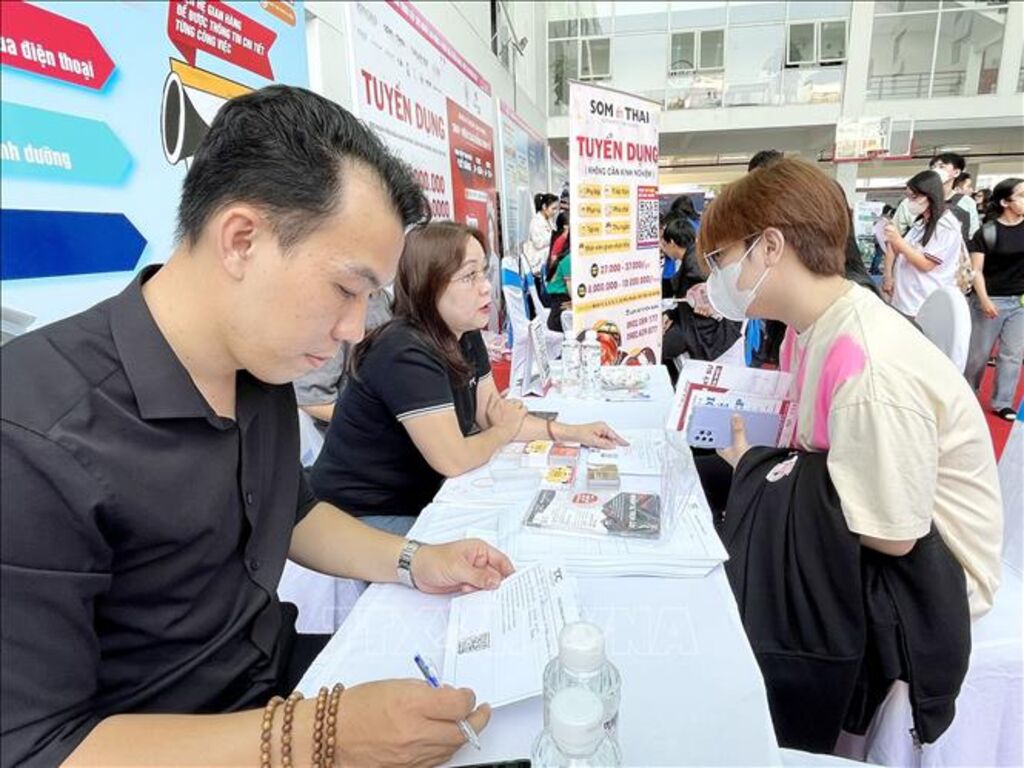 |
| Guiding young people to find suitable jobs during the 2024 Job Recruitment Fair in Ho Chi Minh City__Photo: VNA |
The Ministry of Labor, Invalids and Social Affairs (MOLISA) has recently released the latest draft of the amended Law on Employment with several significant changes.
With 145 articles arranged in eight chapters, the draft law expands the scope of compulsory unemployment insurance, sets out flexible regulations on levels of unemployment insurance premium payment, adds more unemployment insurance benefits, and provides additional incentives for Vietnamese workers wishing to work abroad.
Compared to the 2013 Law on Employment, the draft law has three more groups of employees in the state and non-state sectors who would be obliged to participate in unemployment insurance.
The first group consists of employees working under labor contracts with a term of one month or longer. The second group encompasses part-time employees whose monthly wage is equal to or higher than the wage used as a base for mandatory social insurance payment, which is at least half of the highest region-based monthly minimum wage announced by the Government. The third group comprises salaried enterprise managers and supervisors, representatives of the state capital and representatives of enterprises’ capital contributions at companies and parent companies, and managers and executives of cooperatives and unions of cooperatives.
Employees working under probationary contracts; persons being on pension, social insurance allowances or monthly allowances; workers eligible for pension benefits but yet to receive pension; and domestic workers would not be required to participate in unemployment insurance.
Regarding the rate of contribution to the Unemployment Insurance Fund, the 2013 Law on Employment stipulates that both employers and employees must pay unemployment insurance premium at the fixed rate of 1 percent of employees’ monthly wage. The draft law no longer sets a fixed rate. It instead stipulates that every month, each employee would pay at most 1 percent of his monthly wage to the Unemployment Insurance Fund and each employer would make contribution to the Fund at the maximum rate of 1 percent of monthly wages of employees currently participating in unemployment insurance. In addition, the State might provide support for payment of unemployment insurance premiums not exceeding 1 percent of the monthly wage fund. The specific rate of contribution to the Unemployment Insurance Fund would be decided by the Government to suit practical situation in each period.
Notably, unemployment insurance participants would be entitled to more benefits under the draft law. In addition to unemployment allowance and career counseling and job placement for unemployed workers, the Unemployment Insurance Fund would provide support for employers to organize training and further training to employees to help them improve their qualifications and occupational skills and for employees to participate in training courses and sitting in assessment for grant of national occupational skills certificates. In addition, employers that employ people with disabilities would also receive financial support from the Unemployment Insurance Fund.
In cases of economic crisis or recession, disasters, fires, enemy sabotage or dangerous epidemics, the Government would, based on the Unemployment Insurance Fund’s balance, prescribe the provision of support in the form of cash assistance, support for payment of unemployment insurance, among others.
In order to create opportunities for more Vietnamese workers to go abroad to work as guest workers, the draft law also expands the scope of subjects eligible for borrowing preferential loans for such purpose. They include ethnic minority people; members of poor and near-poor households, households having just escaped poverty and households with an average standard of living; relatives of people with meritorious service to the revolution; workers in ethnic minority and mountainous areas and extremely difficult communes in alluvial areas, coastal areas and islands; people subject to recovery of agricultural land; and youths having fulfilled the military or police service obligation or completed working under volunteer programs, schemes and projects and young intellectuals having accomplished tasks in defense-economic zones.
The draft law is scheduled to be tabled to the National Assembly for discussion in October this year.- (VLLF)









